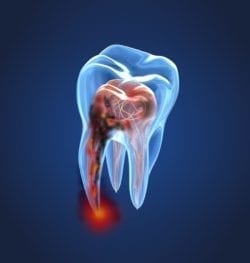
Periodontal disease is a common dental affliction that affects one out of every two American adults aged 30 and over. In fact, it’s the leading cause of tooth loss in adults in the western world. However, periodontal disease puts more than your teeth at risk. Periodontal disease has also been linked to an increased risk of Alzheimer’s Disease, rheumatoid arthritis, pancreatic cancer, diabetes, stroke, heart disease and more.
Dr. Clement Monroe and Dr. Kamron Monroe of Monroe & Monroe Implant and General Dentistry in Pinehurst, NC want you to be aware of the signs of periodontal disease to help you keep your teeth healthy and strong.
What Is Periodontal Disease?
Periodontal means “around the tooth” in Greek. Periodontal disease — periodontitis — is also more commonly known as gum disease. This infection of the gum tissues that surround the teeth and the underlying jawbone that anchors the teeth in place begins with bacteria in the mouth. This naturally occurring bacteria can infect and irritate your gum tissues, and, if untreated, it can end with receding gums, bone loss and lost teeth.
What Causes Gum Disease?
The chief culprit behind gum disease is bacteria in plaque that is allowed to thrive unchecked. It’s natural for everyone to have some bacteria in their mouths, even if they brush and floss every day. However, if our oral hygiene regimen is not followed faithfully, the bacteria can get out of control and begin eating away at our tooth enamel (tooth decay) and causing our gum tissue to become irritated and inflamed, leading to periodontal disease.
Other factors that could lead to periodontal disease include:
- Smoking/tobacco use
- Hormonal changes (puberty, pregnancy, or menopause)
- Certain illnesses
- Genetics
- Poor nutrition
- Stress
- Clenching or grinding teeth
Stages Of Periodontal Disease
Gingivitis is when bacteria has caused inflammation of the gum tissue but it has not yet progressed to bone loss. At this stage of gum disease, the condition is mild and still reversible with treatment. Furthermore, not all gingivitis will become periodontal disease but gingivitis makes it more likely. Although the plaque has accumulated on the teeth and the gums have become inflamed, the teeth are still firm in their sockets. However, if this condition is not treated, this inflammation can progress to become full-fledged periodontitis which can lead to tooth loss.
Periodontal disease is when the destruction has reached the underlying bone. The pockets created by gum inflammation deepen and more gum tissue and bone are affected. Eventually, due to compromised jaw bone tissue, the teeth can become loose and fall out.
What Are the Symptoms?
- Gums that bleed easily while brushing and flossing.
- Swollen or tender gums.
- Gums that pull away from teeth.
- Changes in the way teeth fit together upon biting down.
- Deep pockets between teeth and gums.
- Loose or shifting teeth.
- Pus between your teeth and gums.
- Persistent bad breath or bad taste in the mouth.
- New spaces developing between your teeth.
When You Should See a Dentist
The symptoms of periodontitis may not be painful and you might not even realize you are having them until your teeth are being directly affected. Having a periodontal exam, accompanied by an annual x-ray by Dr. Monroe or your area dentist is the best method of diagnosing and treating gum disease. If it has been over 6 months since your last dental examination, or if you are experiencing any of the symptoms described above, schedule an appointment with your dentist as soon as possible. Gum disease can have a negative affect on your overall health if not treated early.
Monroe & Monroe Implant and General Dentistry in Pinehurst, NC wants to help you prevent, diagnose, and treat gum disease. Routine cleanings and check-ups combined with minimally invasive treatments can protect your teeth and gums from periodontal disease for years to come. Your bleeding gums might be a sign of periodontal disease. Don’t wait to find out! Contact us online today to schedule an appointment or call 910.420.3670.
